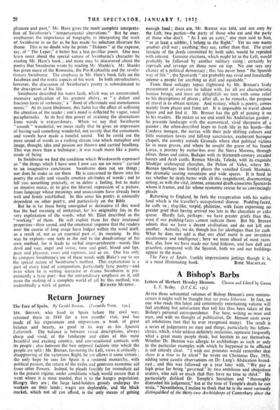Return Journey
The Face of Spain. By Gerald Brenan. (Turnstile Press. 155.) Mit. BRENAN, who lived in Spain before the civil war, returned there in 1949 for a two months' visit, and has made of his experiences and impressions a book of great balance and beauty, as good in its way as his Spanish Labyrinth. The balance is between visual descriptions, always sharp and vivid, of the landscape and cities of this most beautiful and exciting country, and conversational contacts with its people ; also between the two opposed factions into which the people are split ; Mr. Brenan, favouring the Left, views it critically ; disapproving of the victorious Right, he yct'allows it some virtues ; the only hope he sees for Spain is a restored monarchy, with political pardon, the return of the exiles and generous economic aid from other Powers. Indeed, he pleads forcibly for immediate aid to the present regime, under conditions which would ensure that it went where it is most needed, that is to the hungry population. Hungry they are ; the large land-holders grossly underpay the workers on their lands ; wages are deplorable, and the black market, which not all can afford, is the only means of getting
enough food ; there are, Mr. Brenan was told, and not only by the Left, two parties—the party of those who eat and the party of those who don't. " As I am an cater," one man said to him, " or at least a nibbler, I belong to the Right." Yet no one wants another civil war ; anything; they say, rather than that. The cruel ferocity of the deeds committed by both sides would be repeated with interest. Genuine elections, which might let in the Left, would probably be followed by another military rising ; certainly by reprisals and revenge on those now on top. No one sees any chance of a political democracy ; this has never been " the Spanish way of life " ; the Spaniards " are probably too vivid and fanatically intense a people for anything so dull and equitable." From these unhappy topics (lightened by Mr. Brenan's lively presentment of everyone he talked with, for all are characteristic human beings, and most arc delightful) we turn with some relief to his descriptions of places ; after all, as he remarks, the purpose of travel is to obtain ecstasy. And ecstasy, which is poetry, comes mainly from places and from art. It is impossible to travel about Spain and not find it. Mr. Brenan has the gift of passing it on to his readers. He makes us see and smell his Andalucian garden ; he presents landscape with the economical, vivid sharpness of a painter ; the often-described leaps to fresh life in his hands—the Cordova mosque, the sierras with their pale shifting colours and little mountain towns and hill-top sanctuaries, exuberant baroque chapels, the country outside Granada where shot political victims lie in mass graves, and where he sought the grave of his friend Lorca, a journey by motor-bus over the Sierra Morena, through olives, ilexes and cistus, Badajos with its thirteenth-century arcaded houses and Arab castle, Roman Merida, Toledo, with its exquisite Mudejar arabesqued churches, the Pefion of Velez, where Mr. Brenan (perhaps too firmly) places the vanished Greek Mainake, the dramatic soaring mountains and wide spaces. It is hard to say whether he deals better with all this magnificent, disconcerting setting, or with the vital, intense, animated death-conscious Spaniards whom it frames, and for whose economic rescue he so convincingly pleads Returning to England, he feels the exasperation with his native land which is the traveller's occupational disease. Pudding-faced, he calls us ; slug-like, torpid, philistine, with faces expressing no greater grief than having arrived too late in the chocolate or cake queue. Hardly fair, perhaps: we have greater griefs than this, even if our pudding-faces cannot indicate them. But Mr. Brenan admits that we have a decent civilisation and do not kill one another. Actually, we do, though less for ideologies than for cash. What he does not add is that our chief merit is our inventive creativeness and intelligence ; here we seem ahead of most races. But, alas, how we have made our land hideous, and how dull and graceless, compared with the Spanish, both we and our buildings appear in the mass.
The Face of Spain. frankly impressionist jottings though it is,






































 Previous page
Previous page